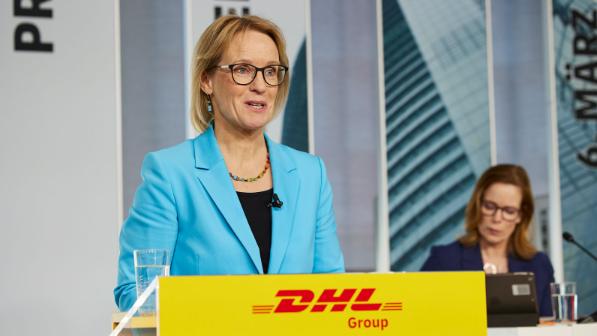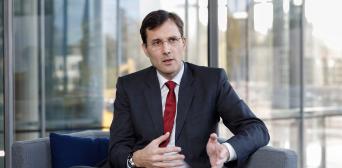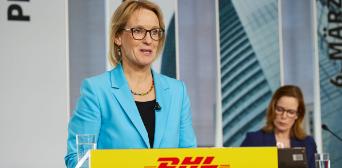Resilient business model: DHL Group achieves annual targets for 2023 in a weak global economic environment
After a record year in 2022, DHL Group achieved a revenue of EUR 81.8 billion in the financial year of 2023 (2022: EUR 94.4 billion) and an operating result (EBIT) of EUR 6.3 billion (2022: EUR 8.4 billion).
- Group revenue of EUR 81.8 billion and EBIT of EUR 6.3 billion significantly above pre-pandemic levels
- Free cash flow of EUR 3.3 billion excluding acquisitions and divestments (net M&A) significantly exceeds forecast
- Board of Management and Supervisory Board propose a stable dividend of EUR 1.85 per share to the annual general meeting
- Share buyback program extended until 2025 and increased by EUR 1 billion to EUR 4 billion
- DHL Group expects operating profit of EUR 6.0-6.6 billion and free cash flow excluding net M&A of approximately EUR 3.0 billion in 2024
- For 2026, the Group expects operating profit of EUR 7.5-8.5 billion
- CEO Tobias Meyer: "We are continuing to invest in our logistics network - particularly in our e-commerce capabilities, but also in the decarbonization and digitalization of our operations. We are very well positioned for the current opportunities and challenges."
Bonn - After a record year in 2022, DHL Group achieved a revenue of EUR 81.8 billion in the financial year of 2023 (2022: EUR 94.4 billion) and an operating result (EBIT) of EUR 6.3 billion (2022: EUR 8.4 billion). Even in the absence of a significant recovery in the global economy, DHL Group met its earnings forecast of at least EUR 6.2 billion. At EUR 3.3 billion (2022: EUR 4.6 billion), free cash flow excluding net M&A was significantly above the 2023 forecast of EUR 3 billion. With EBIT and free cash flow well above the figures for the pre-pandemic year 2019, the Group demonstrated its increased earning capacity even in a persistently soft market environment.

EBIT forecast above the pre-pandemic figures for 2019 despite a persistently weak global economy
DHL Group still does not foresee a broad economic upturn in the first half of 2024 and even further declining volumes in some markets. The Group anticipates more positive global economic momentum in the second half of the year compared to the second half of 2023. For the financial year of 2024, DHL Group forecasts EBIT of between EUR 6.0 billion and EUR 6.6 billion and free cash flow excluding net M&A of approximately EUR 3.0 billion.
In its medium-term forecast for 2026, DHL Group anticipates an operating result of EUR 7.5-8.5 billion.
| Express | 2022 | 2023 | YOY(1) |
| Revenue(2) | 27,592 | 24,846 | −10.0(3) |
| EBIT(2) | 4,025 | 3,229 | −19.8(3) |
| EBIT margin(3) | 14.6 | 13.0 | −1.6(4) |
| (1) year on year | (2) in EUR million | (3) in percent |
(4) in percentage points |
| Global Forwarding, Freight |
2022 | 2023 | YOY(1) |
| Revenue(2) | 30,212 | 19,305 | −36.1(3) |
| EBIT(2) | 2,311 | 1,423 | −38.4(3) |
| EBIT margin(3) | 7.6 | 7.4 | −0.2(4) |
| (1) year on year | (2) in EUR million | (3) in percent |
(4) in percentage points |
| Supply Chain |
2022 | 2023 | YOY(1) |
| Revenue(2) | 16,431 | 16,958 | +3.2(3) |
| EBIT(2) | 893 | 961 | +7.6(3) |
| EBIT margin(3) | 5.4 | 5.7 | +0.3(4) |
| (1) year on year | (2) in EUR million | (3) in percent |
(4) in percentage points |
| eCommerce |
2022 | 2023 | YOY(1) |
| Revenue(2) | 6,142 | 6,315 | +2.8(3) |
| EBIT(2) | 389 | 292 | −24.9(3) |
| EBIT margin(3) | 6.3 | 4.6 | −1.7(4) |
| (1) year on year | (2) in EUR million | (3) in percent |
(4) in percentage points |
| Post & Parcel Germany |
2022 | 2023 | YOY(1) |
| Revenue(2) | 16,779 |
16,892 | +0.7(3) |
| EBIT(2) | 1,271 | 870 | −31.5(3) |
| EBIT margin(3) | 7.6 | 5.2 | −2.4(4) |
| (1) year on year | (2) in EUR million | (3) in percent |
(4) in percentage points |

Daniel Gabel
Financial Communications, Global Business Services
DHL Group
Charles-de-Gaulle-Str. 20
53113 Bonn
Germany



